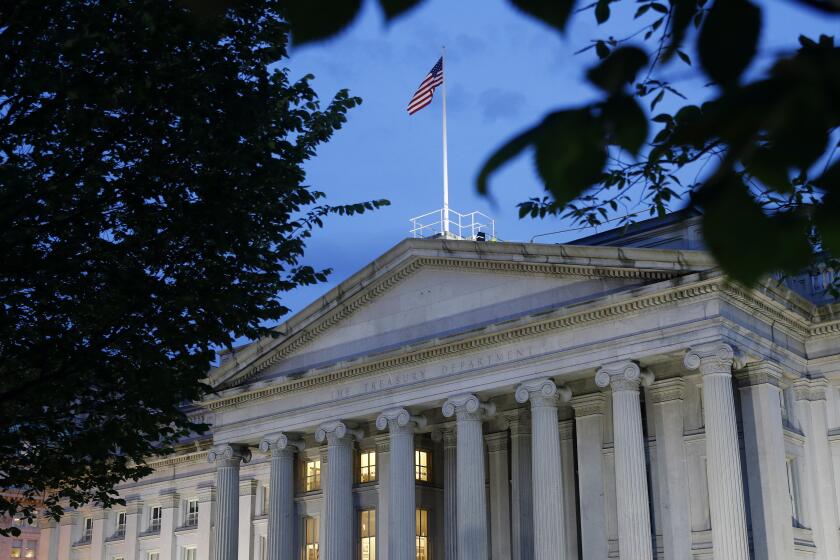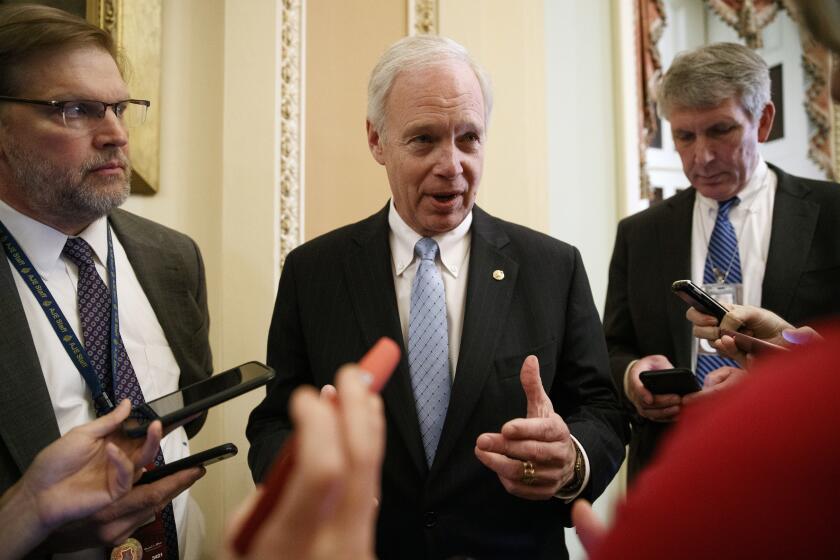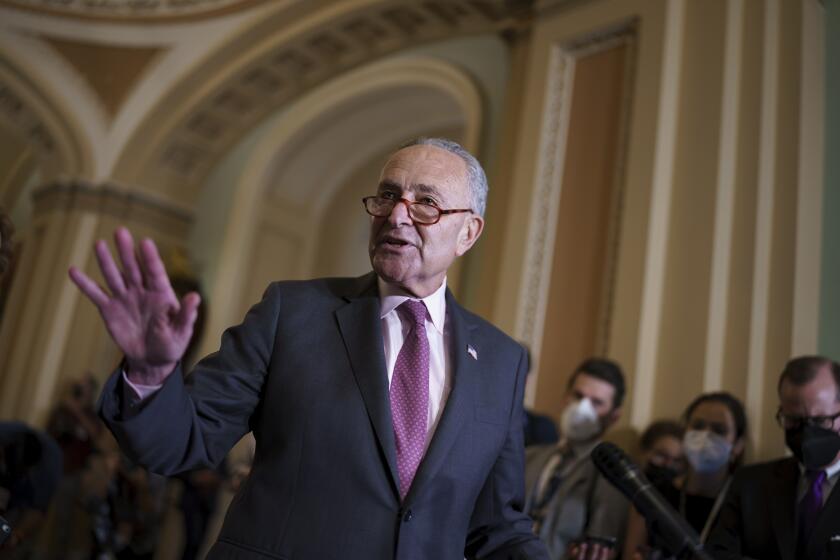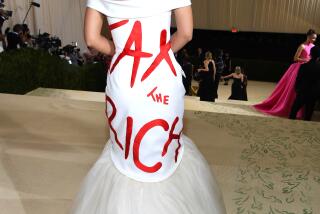Could a $1-trillion coin fix the U.S. debt ceiling problem? Some think it might
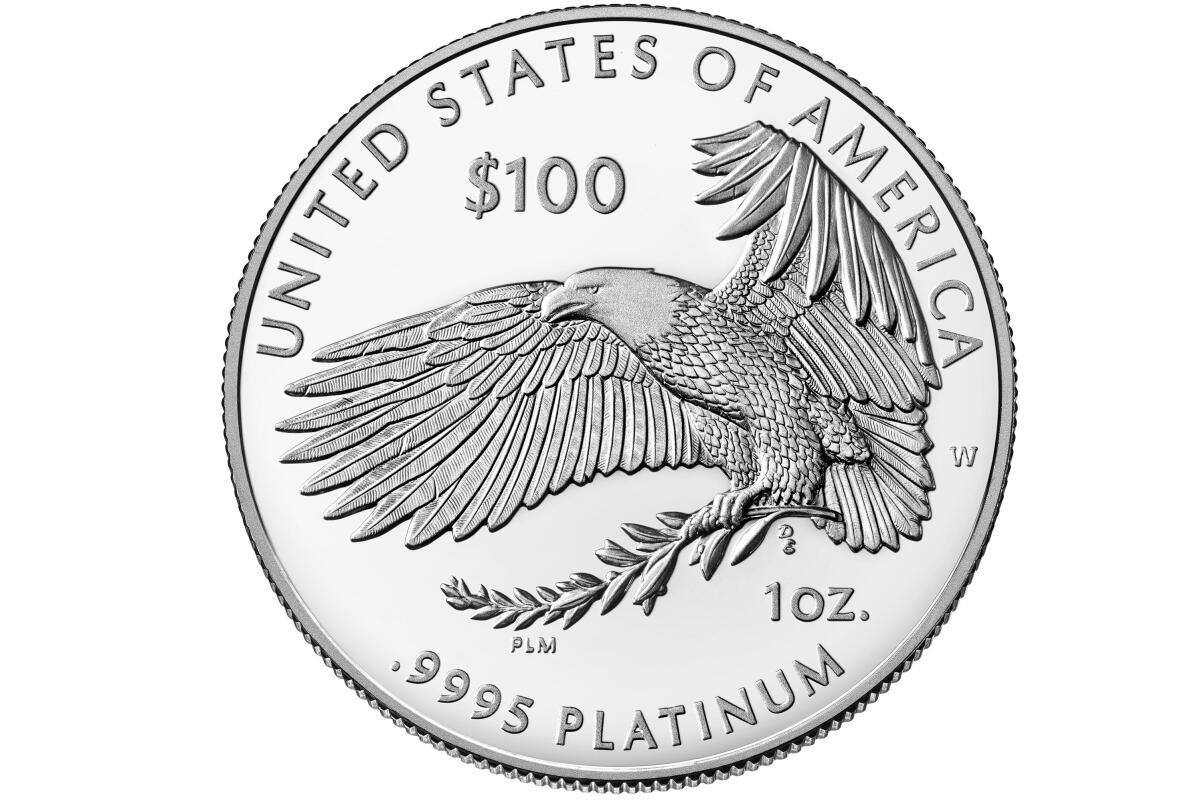
- Share via
WASHINGTON — Some politicians think they’ve found a silver bullet for the impasse over the U.S. debt ceiling, except that the bullet is made of platinum: Mint a $1-trillion coin — the token of all tokens — use it to flood the U.S. Treasury with cash, pay lots of bills and drive Republicans crazy.
Even its serious proponents — who are not that many — call it a gimmick. They say it’s an oddball way out of an oddball accounting problem that will have severe consequences for average people’s pocketbooks and the economy if the issue is not resolved in coming days.
Despite all the jokes about who should go on the face of the coin — Chuck E. Cheese? Donald Trump, to tempt or taunt the GOP? — there’s real scholarship behind the idea. However improbable, it is conceivable that the government could turn $1 trillion into a coin of the realm without lawmakers having a say.
How is this possible when the Treasury secretary can’t simply print money to pay public debts? It’s because a quirky law from more than 20 years ago seems to allow the administration to mint coins of any denomination without congressional approval as long as they’re platinum.
The intent was to help with the production of commemorative coins for collectors, not to create a nuclear option in a fiscal crisis. Oops.
Specifically, the law says the Treasury secretary “may mint and issue platinum bullion coins and proof platinum coins in accordance with such specifications, designs, varieties, quantities, denominations, and inscriptions as the Secretary, in the Secretary’s discretion, may prescribe from time to time.”
The Treasury would have to default on some government bills, possibly including checks to investors and retirees.
This is that time, in the view of coin advocates. But Treasury Secretary Janet L. Yellen, the White House and some Democrats slapped down the idea Tuesday, just as past leaders have done when the going got tough and radical quick-fixes emerged.
“The only thing kookier would be a politically inflicted default,” Sen. Mark R. Warner (D-Va.) said of the coin.
Said Yellen: “What’s necessary is for Congress to show that the world can count on America paying its debt.” A platinum coin, she told CNBC, “is really a gimmick.”
Sure it is, but that’s the whole idea, said Rohan Grey, a Willamette University law professor and expert on fiscal policy.
Bitcoin topped $50,000 for the first time since May as crypto prices continued an ongoing recovery from a disorderly rout just three months ago.
“The fact that [the coin] represents an accounting gimmick is a source of its strength, rather than a weakness,” Grey wrote in a 2020-21 study in the Kentucky Law Journal. “The idea of ‘fighting an accounting problem with an accounting solution’ is entirely coherent. ... The debt ceiling itself can be viewed as one big, poorly designed accounting gimmick.”
The United States will hit the ceiling Oct. 18 unless Congress acts in time to suspend it. The two parties are in a stalemate in the Senate, with Republicans unwilling to join Democrats in what used to be a routine exercise and Democrats holding back on using only their own votes to fix the problem.
That’s what makes a shiny coin with a “1” followed by 12 zeroes tempting to some, if that untested and audacious path actually would work.
But fraught questions arise for lots of Democrats as well as Republicans: Would they have wanted former President Trump to be ordering up mega-coins? Do they want the next president to have that power? Or even this one?
With the U.S. economy on the line, the GOP again threatens to block an increase in U.S. debt limit.
Other extraordinary possibilities have been floated, too, such as invoking the 14th Amendment’s guarantee that the “validity of the public debt of the United States, authorized by law ... shall not be questioned,” which some scholars argue could be used to override the debt limit.
The White House has looked at all such options, “and none of those options were viable,” Press Secretary Jen Psaki said. “So we know that the only path forward here is through Congress acting.”
The debt ceiling was instituted in the World War I era to make it easier for the U.S. to issue war bonds without needing congressional approval each time. Legislators needed only to keep the amount under the approved total.
Raising or suspending the ceiling has been a mostly uncontroversial task until recent times, because the debt comes mostly from spending that has already been approved by Congress or covers payments mandated by law. Now, everything is fodder for a fight to the last minute.
The Senate is poised to approve legislation that would fund the federal government into early December, but a new battle over the debt limit looms.
The Treasury can’t introduce new currency into circulation; only the U.S. Federal Reserve can do that. In theory, the $1-trillion coin would be minted and deposited with the Fed, and its value would make its way into the Treasury’s general account and used to pay a whole lot of bills.
In practice, no one knows precisely how it would work and what problems, like inflation, would result. Democrats do not seem willing to upend a messy process that for generations has nevertheless stood as the gold standard in global credit.
The idea of a $1-trillion coin got attention in 2013 when President Obama struggled to get Republicans on board. Donald Marron, a tax policy expert who had led the Congressional Budget Office, thought it wasn’t a great idea — but not a terrible one, either.
“Analysts have considered a range of other options for avoiding default, including prioritizing payments, asserting the debt limit is unconstitutional and temporarily selling the gold in Ft. Knox,” Marron said then. “All raise severe practical, legal and image problems. In this ugly group, the platinum coin looks relatively shiny.”
Still, he said, it sounded like something from an Austin Powers movie or a “Simpsons” episode: “It lacks dignity.”
More to Read
Sign up for Essential California
The most important California stories and recommendations in your inbox every morning.
You may occasionally receive promotional content from the Los Angeles Times.
